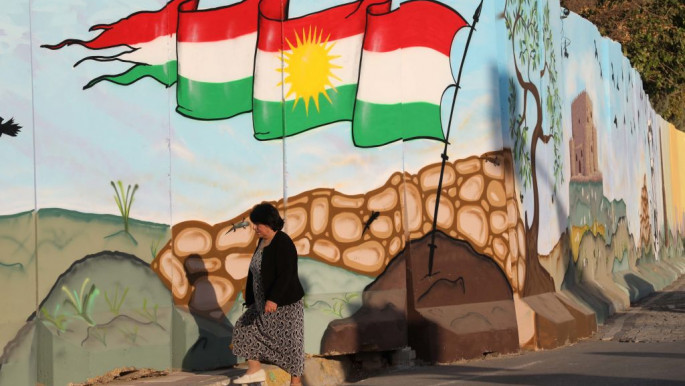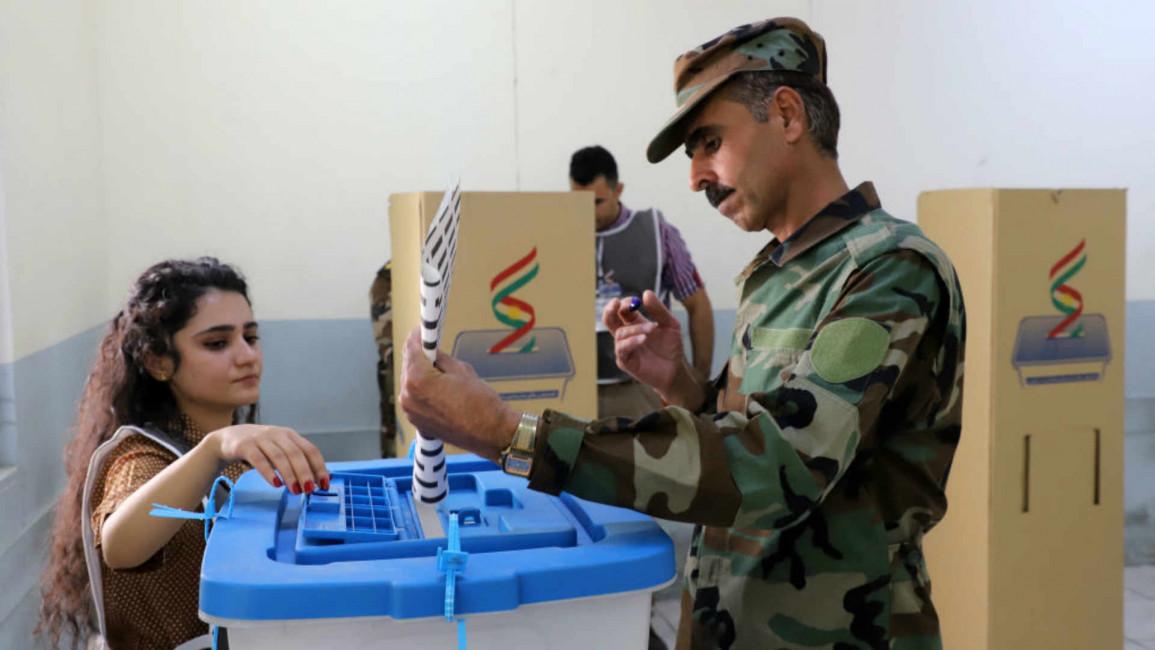
Unease brews as Iraqi Kurds brace for crucial election
These elections fall at a sensitive juncture in its history, coming just over a year after the landmark independence referendum where national fervour quickly turned to despair amid heavy-handed reprisals from Baghdad, that were supported by neighbours such as Turkey and Iran, and even the Kurds traditional western ally - the United States.
The fallout from the loss of Kirkuk and other disputed territories, and the significant oil revenues that it yielded, compounded social unrest, economic woes and growing political divisions within Kurdistan.
The events in the aftermath of the referendum underscored political discord between the ruling parties that
continues to blight the region today.
Masoud Barzani, leader of the Kurdistan Democratic Party (KDP) who resigned as president shortly after the referendum poll, accused the Patriotic Union of Kurdistan (PUK) of treason over the surrender of Kirkuk.
PUK forces, put up little resistance as Iraqi forces were deployed, a move some viewed as part of an Iranian-orchestrated deal with Baghdad.
This not only exposed divisions between the KDP and PUK but within the PUK itself. These splinters within the PUK had increased with the death of influential leader and party founder, Jalal Talabani in 2017.
The emotive and physical losses from the referendum led to anger and resentment, but as the May Iraqi elections showed, it may not have drastically altered the political landscape, as the KDP kept its 25 seats and the PUK was marginally down from its 2014 results, with 18 seats.
The Gorran (or Change) Movement, which has undoubtedly transformed the Kurdistan political landscape since its founding in 2009, had strong showings in 2009 and 2013 Kurdistan elections, but lost four seats in the recent Iraqi elections.
 |
The Kurds remain a strategic power that cannot be ignored but the exact leverage will come down to the unity they can contrive |  |
The two new opposition parties on the scene fell some way short of their own high expectations, with New Generation Movement, led by Shaswar Abdulwahid, winning four seats while the Coalition for Democracy and Justice (CDJ), led by Barhem Salih, mustered only two seats. The Kurdistan Islamic Group and the Kurdistan Islamic Union both lost ground, with two seats each.
The Gorran Movement was the second largest bloc after the 2013 elections, but has suffered with the loss of its own influential leader Nawshirwan Mustafa, who passed away in 2017. In a similar vein to the PUK, it has failed to unite behind a strong figurehead ever since and has been dogged with infighting.
The Kurdish vote in the Iraqi elections was marred with controversy, as opposition parties alleged fraud and intimidation from security forces. However, while the Iraqi elections may not be an exact prelude to the Kurdistan elections, especially in light of the low turnout, the opposition parties still lack clout or a proven track record of significantly altering Kurdistan's political roadmap.
Read more: Abadi's capture of Kirkuk might just save Iraq
Some analysts looked to a loss of KDP seats as a result of the referendum fallout and the punitive actions by Baghdad and its neighbours that followed, but nationalist sway as a result of these actions to punish the Kurds, the perceived back dealings of the PUK, and the lack of united or credible opposition, will have emboldened the KDP voter base.
Twitter Post
|
As such, the KDP is highly likely to retain grip on its traditional support base of Erbil and Duhok, and can point to significant progress and continued stability under its rule, especially in Erbil governorate. However, this is not to say that its own regions are without issues. Corruption, lack of electricity, irregular salary payments and an economy that remains too tightly tied to oil exports are just some of the issues at hand.
In addition, voter turnout across Kurdistan is a useful indicator of electorate sentiment, with low voter turnout suggesting apathy among voters and a lack of faith in change to the status-quo, or credible alternatives.
Either way, as with the 2009 and 2013 parliamentary elections, it appears that the Suleimaniya governorate will be the main battleground for the PUK and the plethora of opposition parties.
The likes of Gorran, and now the CDJ, were essentially offshoots of the PUK, and the PUK has tried in recent times to reunite ranks. It has seen some recent success, managing to win its former leader Salih back into the PUK fold, with the proviso of nominating Salih for Iraqi presidency.
The fact the KDP chose not to back the PUK nomination for Iraqi president, opting to nominate Fuad Hussein as their own candidate, tells its own story.
While since 2005 the KDP and PUK powerhouse has been more evenly split - running on the same electoral lists, today, the KDP doesn't feel that the PUK's current political leverage gives it the same right to positions of power as before.
It's also a representation of the disunity among Kurdish parties as they negotiate with potential partners in the formation of Iraq's government.
Even today, the Kurds have not formally sided with any one coalition. Logically, they may have joined the coalition of Haider al-Abadi and Muqtada al-Sadr, favoured by their traditional western allies, but the Kurdish hesitation marks a feeling of unease with each other, the Shia dominated blocs in Baghdad, and even the US.
 |
The Kurdish hesitation marks a feeling of unease with each other, with the Shia dominated blocs in Baghdad, and even with the US |  |
The fact that Washington was relatively muted as Abadi showcased a strong hand to boost his electoral hopes as well as teach Kurds a lesson, will not have been lost on most Kurds.
As the KDP and PUK continue to dominate the Kurdish political scene, there remains a significant risk that Kurdish policies in Baghdad and beyond will be divided, exposing cracks that will manipulated by foreign powers.
In the unlikely event that the KDP is sidelined in any new government, and that the opposition parties can strike a coalition agreement, this will not be seen favourably by Ankara or Washington.
Historically, the KDP has enjoyed much stronger economic and strategic ties with Turkey, adopting a tougher stance on the Kurdistan Workers Party (PKK) as well as the People's Defense Units (YPG) in Syria, and allowing Turkish actions against the PKK on its territory. Meanwhile, PUK maintains its historically good ties with Iran.
 |
|
| Voters in Iraq's Kurdistan elect a new parliament on September 30, a year after voting in favour of independence [AFP] |
Either way, unless the main Kurdish parties can find a new political balance and a united approach to relations with Baghdad and beyond, the Kurdish region is at risk of losing what influence it has.
The post-2013 parliamentary crisis that ensued clearly demonstrates the dangers of frail coalitions and power sharing agreements.
Ultimately, even after the bitter experience of the independence referendum, the Kurds remain a strategic power that cannot be ignored but the exact leverage will come down to the unity they can contrive.
For example, they are still potential kingmakers in the new Iraqi government, their role in Iraq's future as mediators can boost their hand, while the stability and prosperity of the Kurdistan region remains vital to Iraq, and - albeit indirectly - to the US, EU and greater Middle East.
The Kurdistan parliamentary elections may give a new mandate for Kurdish negotiations in Baghdad. Played carefully, the Kurds can still attain key concessions from Baghdad, including resolution of disputed territories, and a fair share of national budget and oil exports.
Bashdar Ismaeel is a writer and geopolitical, energy and security analyst.
Follow him on Twitter: @BashdarIsmaeel
Opinions expressed in this article remain those of the author and do not necessarily represent those of The New Arab, its editorial board or staff.



